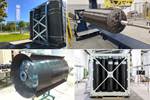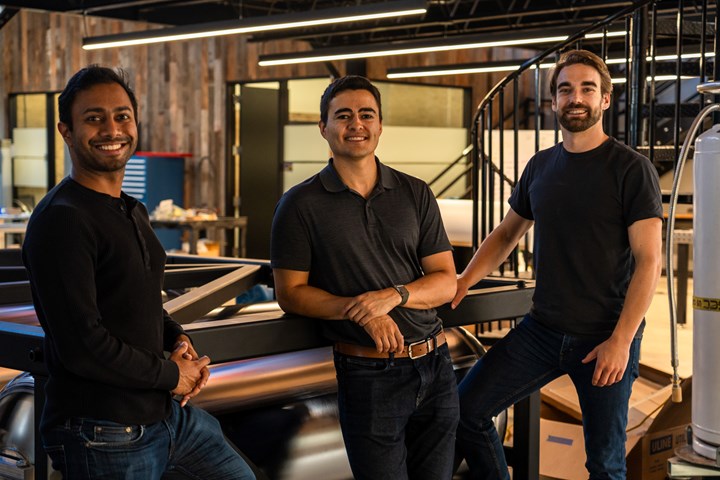Verne reaches $15.5 million in funding to support CcH2 technologies
Additional investment round backs verified high-density hydrogen storage to help heavy-duty transportation transition over to zero emissions.
Verne’s three founders (from left to right): Bav Roy, co-founder and COO; David Jaramillo, co-founder and CTO; and Ted McKlveen, co-founder and CEO. Source | Verne
Verne (San Francisco, Calif., U.S.) announces a strategic fundraising round that brought the company to $15.5 million, including grant funding, to enable the company to accelerate development of its cryo-compressed hydrogen (CcH2) technology for on-board hydrogen storage for heavy-duty vehicles.
Fundraising was led by Trucks Venture Capital, with participation from existing investors Collaborative Fund and Amazon’s Climate Pledge Fund, and new investors United Airlines Ventures Sustainable Flight Fund and Newlab.
Large energy requirements and the importance of total cost of ownership can make it difficult for heavy-duty fleets to transition from diesel to zero-emission technologies. Moreover, existing Class 8 battery-electric trucks provide limited range (approximately 200 miles versus 1,000 miles for a diesel truck), weigh 5,000-10,000 pounds more than a diesel truck (reducing payload available to haul cargo by 5-15%) and can take more than 2 hours to refuel.
Since its founding in 2020, Verne has been dedicated to solving this challenge by developing high-density hydrogen storage that could enables these vehicles to reach diesel-equivalent range and payload. Verne’s CcH2 technology involves cooling and compressing hydrogen to achieve maximum hydrogen density at 73 grams/liter internal density, a 33% improvement over liquid hydrogen and an 87% improvement over traditional 700-bar compressed gas hydrogen. The increased density leads to greater range and payload: Verne says its CcH2 tanks enable semi-trucks to achieve diesel-equivalent range — or over 900 miles — without adding any weight to the system.
“Heavy-duty vehicles like semi-trucks and cargo handling equipment are vital to the functioning of our economy, but they are also some of the worst polluters. Verne is motivated to provide zero-emission solutions that don’t require these critical industries to make costly performance tradeoffs,” says Ted McKlveen, co-founder and CEO of Verne. “Bringing on new strategic investors, and strengthening our partnership with existing investors, will help us accelerate our path to market and decarbonize this critical industry.”
In 2023, Verne announced a CcH2 storage record during stationary demonstration of a 29-kilogram storage tank at Lawrence Livermore National Laboratory (LLNL). Verne also completed the first testing of its CcH2 storage system on-board a vehicle as part of the company’s participation in the Breakthrough Energy Fellows program. This on-vehicle testing validated the performance of all sub-systems — including direct integration with the vehicles’ fuel cell — and confirmed the improved hydrogen density relative to the standard 700-bar compressed gas hydrogen storage method. These technical results have prepared Verne to meet the commercial interest it is are receiving from key trucking fleets and OEMs, as well as partners across aviation, ports, mining and hydrogen distribution and refueling.
Related Content
-
Multi-material steel/composite leaf spring targets lightweight, high-volume applications
Rassini International was challenged by Ford Motor Co. to take weight out of the F-150 pickup truck. Rassini responded with a multi-material steel/composite hybrid leaf spring system that can be manufactured at high volumes.
-
Infinite Composites: Type V tanks for space, hydrogen, automotive and more
After a decade of proving its linerless, weight-saving composite tanks with NASA and more than 30 aerospace companies, this CryoSphere pioneer is scaling for growth in commercial space and sustainable transportation on Earth.
-
The state of recycled carbon fiber
As the need for carbon fiber rises, can recycling fill the gap?

















